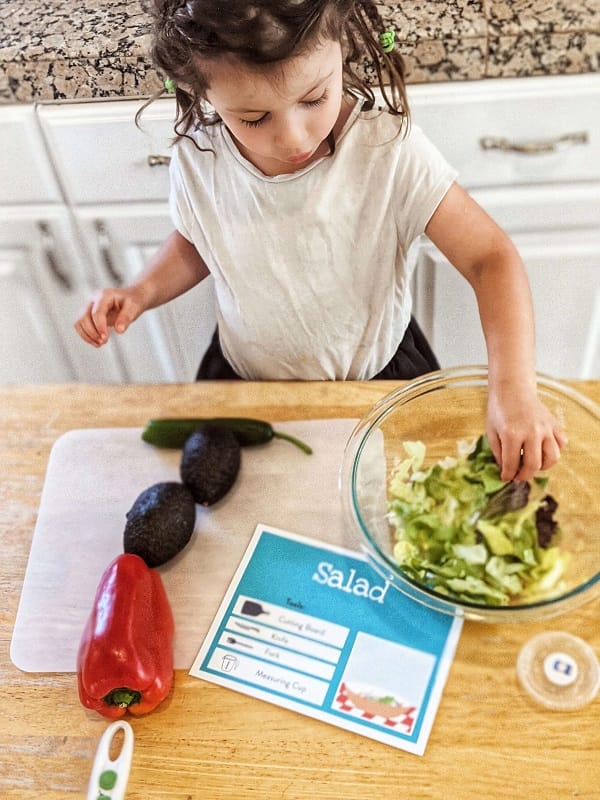Childhood is a special time, where you have no responsibilities, are free to make mistakes and magic is real. It’s a time of endless birthday parties, constant snacks and begging for your favorite cereal in the grocery store. It’s also a time of growing. And growing requires good nutrition.
As parents, it is challenging to know when we should encourage healthy eating and when we need to indulge in a little youthfull carelessness. How much does childhood nutrition matter anyway?

Benefits of Good Nutrition
Kids who eat better do better in school. This might seem obvious to any college student running on red bull and snickers bars, but it actually starts years before the SATs. Early childhood is a time to plant the seeds. In fact, preschool aged children who have better nutrition perform better in school because they’re able to learn better.
Childhood nutrition primarily matters because kids need nutrients to grow. It’s also important because it gives kids a taste for healthy food. And that they will carry through life. Children who eat more fruits and vegetables as kids grow into adults who eat more fruits and vegetables. So there are really 2 reasons kids need to learn how to eat: They need to grow and they need to build a strong foundation for lifelong health.

The Benefits of Letting Them Eat Cake
So should we hide all the candy and serve fruit salad at birthday parties? Studies show that kids who have restricted access to junk food actually end up eating more. Since candy and other treats are forbidden to them, they make the most of every opportunity to eat them.
Restricting a child’s exposure to junk food also robs them of the opportunity to learn how to self-regulate. That means these kids grow into teenagers and then adults who never learned how to eat only 1 slice of cake. Young children are very good at self-regulating, so it’s in their own best interest to help develop that skill. The honest truth is that they won’t be kids forever. Instead of making food decisions for them, we need to teach them how to make smart choices on their own.
But the real reason to let kids eat cake is that it’s delicious. So let’s teach them to enjoy life. Food is a special way to create memories for your family. From birthday cakes to Grandma’s Famous Chocolate Chip Cookies, childhood treats help preserve life-long memories.

Does Childhood Nutrition even matter?
Add Your Heading Text Here
In a word, YES. The patterns and expectations we set in early childhood really lay the groundwork for our kids’ health. So what can you do? Here are 5 tips.
- Serve Healthy Foods – Breakfast, lunch, dinner and yes, even snacks should be healthy. That doesn’t mean your kids should drink kale smoothies every day after school, but it also doesn’t mean they should eat junk food all day. Fruit, vegetables and whole grains are the foundation for healthy eating. Try to include at least 1 of those into every snack and meal.
- Allow Everything – Make sure in your house, all foods are allowed. That means no hiding cookies in the pantry. No storing chips and crackers on the top shelf. No locking up candy and chocolate bars. Any form of restricting food has a negative impact on kids. So what can you do if you want to encourage healthy eating? Just don’t keep foods you don’t approve of in the house.
- Make Treats Special- Of course your 5 year old is going to want a birthday cake. So let him have a cake. Cake doesn’t need to be an everyday occurrence in your house, but it can definitely be a special treat. Just make sure it’s really special.
- Be an Equal Opportunity Snacker- Sure, cookies have added sugars and what some people call “empty calories“. So instead of making them off limits, serve them with a side of grapes, or a glass of milk. By treating cookies the same way you’re treating grapes, you’re sending the message that both of these foods have a place in a well-balanced diet.
- Be Cool – We’ve all been there: The neighborhood barbecue with unlimited popsicles, or the birthday party with the bottomless pinata. This is a really tough spot for parents who can’t stand to watch their kids gorge themselves on treats. It happens to all of us. So what do you do when you’re on someone else’s turf? Stay cool. Let your kids grab as much as they can from the pinata. Or let them eat a popsicle before dinner. Remember that eating is fun, especially when you’re eating candy. This is a great opportunity to trust in your child’s ability to self-regulate! Once you get home, you can help your child get back on a normal eating schedule. You’re helping your child learn how and when to indulge and how to get back on track, two very important life skills.

What Nutrients Do Kids Need?
A healthy diet is important to ensure that our kids are growing well and staying healthy. But what exactly does that look like? Sugar-free diets? Is dairy ok? Should they even be eating gluten? Here’s a quick guideline for feeding your kids well.
5 Things to Know for Healthy Diets
Whether you’re a kid or an adult, the basics of healthy eating are the same. Well-balanced meals. Plenty of fruits and vegetables, and keep an eye on added sugar. These are some of the key nutrients to understand.
- Added Sugar – This one is a buzz word. It does differ from natural sugar, so it’s always good to check the nutrition facts label. Added sugar now has it’s own line on the label, so it’s easier to see.
- Calcium – So important for growing bones. Kids need calcium to ensure that their bones develop properly. Since childhood is really the prime time for bone growth, it’s really important to make sure that kids are getting enough calcium. Especially if your child doesn’t drink milk, it’s good to find alternative sources of calcium.
- Potassium – Potassium is important because it helps prevent heart disease. Not only should our kids be eating diets that are low in sodium, but they should also be high in potassium. The good news is that potassium is found in many fruits and vegetables.
- Iron -This mineral is important because it helps move oxygen around the body. Not only that, but iron deficiency is a common problem for kids. This can affect their growth, so it’s to keep an eye on how much iron they’re getting.
- Vitamin D – This vitamin is the hero of the nutritional world! So much research is coming out about Vitamin D’s role in depression, inflammation and even cancer prevention. There’s a lot more that scientists are discovering, but for now it’s safe to say that Vitamin D is crucial for kids’ bone development. It helps the body absorbs calcium, so kids need both in order to build healthy bones for life.

